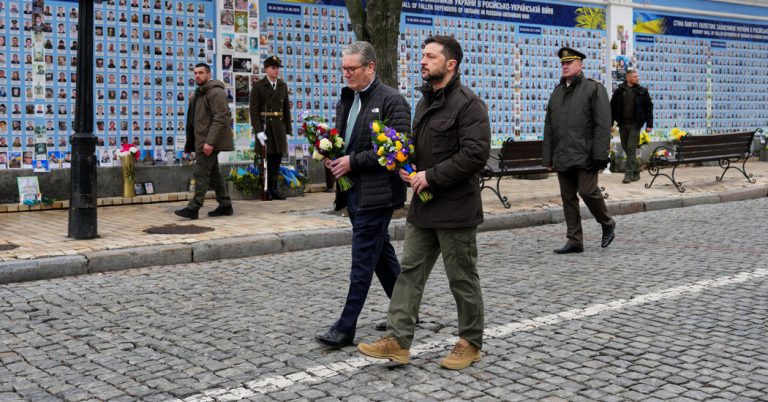British Prime Minister Keir Starmer met with Ukrainian President Volodymyr Zelensky in Kiev on Thursday in a show of solidarity four days before the inauguration of Donald J. Trump.
The trip to Ukraine, the first of Mr. Starmer since becoming prime minister in the summer, comes amid diplomatic turmoil between Kiev and its European allies, who are watching whether Mr. Trump maintains US support for Ukraine in war against Russia. .
Britain is the third largest provider of military aid to Ukraine, after the United States and Germany, and on Thursday Mr. Starmer and Mr. Zelenskiy signed a “100-year partnership” between their two countries.
“We have reached a new level – this is more than just a strategic relationship,” said Mr. Zelensky, according to Ukrainian media.
The agreement will include a special focus on maritime security and promises to strengthen cooperation in technology, healthcare and education. It follows a tighter security deal signed a year ago in response to the invasion ordered by President Vladimir V. Putin of Russia in 2022.
“Putin’s ambition to distance Ukraine from its closest partners was a monumental strategic failure,” said Mr. Starmer in a statement. “On the contrary, we are closer than ever.”
Mr. Trump has said he plans to end the war quickly, but has not said how he will do it. Marco Rubio, his pick for secretary of state, said this week that both Russia and Ukraine would have to make concessions in any negotiations.
Kiev’s official position is that it will not negotiate directly with Mr. Putin, a stance confirmed on Wednesday by Ukrainian Foreign Minister Andriy Sybiha. But Mr. Zelensky said he hoped to meet with Mr. Trump at the first opportunity.
On Thursday, Valery Zaluzhny, Ukraine’s ambassador to Britain and a former commander-in-chief, accompanied Mr. Starmer during the visit. He said the partnership would deepen security ties and enhance cooperation between the two countries.
Mr. Zelensky told a meeting of allies in Germany this month that he planned to hold talks with Mr. Starmer “in the coming weeks” the possibility of sending British peacekeepers to Ukraine. The Ukrainian leader presented the idea to other European leaders, but they met with skepticism.
Ukraine has received support in other ways from other European allies.
German Defense Minister Boris Pistorius said on a visit to Kiev on Tuesday that he was optimistic that Berlin would find a way to send an additional 3 billion euros (about $3.1 billion) in military aid. But Germany is facing its own political turmoil after the government collapsed a month ago.
Mr. Zelensky discussed continued French military support for Ukraine with President Emmanuel Macron in a phone call this week, according to Mr. Zelensky, and a Latvian delegation visited Ukraine on Tuesday to discuss military and humanitarian support.
And on Wednesday, Mr. Zelensky was in Warsaw, where he met with Polish Prime Minister Donald Tusk and Polish President Andrzej Duda. Both have expressed support for Ukraine’s bid to join NATO, a prospect the military alliance has been reluctant to fully support, despite offering significant support to Kiev.
Ukraine has stepped up its efforts on the diplomatic front as Russia’s offensive continues in eastern Ukraine’s Donetsk region.
The last of the modest gains Ukraine made during its counteroffensive in the summer of 2023 have been wiped out, according to an assessment Wednesday by DeepState, an analytical group with ties to the Ukrainian military, after Russian forces captured the village of Neskuchne .
Moscow’s forces are also making progress in their efforts to encircle the key city of Pokrovsk, also in eastern Ukraine, from the south.
As Mr. Starmer was visiting Kiev, the Ukrainian capital was put on air raid alert. Moments later, a loud explosion was heard in the skies above the city. Mayor Vitali Klitschko said air defenses were working and warned residents to stay in shelters.
The British leader and Mr. Zelensky visited a burn unit in a hospital where wounded soldiers and civilians are treated. After introducing Mr. Starmer, Peter, a civilian with burns on his hands and arms, asked: “Prime Minister of Britain, right?” and then added: “If Ukraine falls, so will Europe.”
Mr. Starmer said the injuries he saw at the hospital were “a grim reminder of the heavy price Ukraine is paying”.
Naralia Novosolova and Cassandra Winograd contributed to the report.




